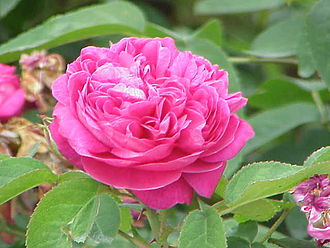Rosa × damascena



Rosa × damascena, commonly known as the Damask rose, is a hybrid rose, derived from Rosa gallica and Rosa moschata. Renowned for its fine fragrance, the Damask rose is widely grown for its oil, known as rose oil, which is used in perfumery, as well as for rose water, rose concrete, and rose absolute. It is also used in the cosmetics industry and in medicine for its various therapeutic properties. The Damask rose has a long history, with its cultivation dating back to ancient times, and it plays a significant role in the cultural traditions of many countries.
Description[edit]
The Damask rose is a deciduous shrub that typically grows to a height of 1.5 to 2.2 meters. It is characterized by its dense, prickly stems and pinnate leaves with five to seven leaflets. The flowers are renowned for their distinctive fragrance and are usually pink to light red in color. Each flower is densely packed with petals and can reach up to 5 cm in diameter. The Damask rose blooms in late spring to early summer, with some varieties known as autumn Damasks also flowering a second time in the fall.
History[edit]
The origins of Rosa × damascena are believed to be in the Middle East, with its cultivation spreading across Europe, North Africa, and Asia over centuries. It is thought to have been first cultivated in ancient Persia, from where it spread to the Roman Empire and then to various parts of Europe. The Damask rose was highly valued in medieval gardens for its scent, medicinal properties, and beauty. It played a significant role in the economies of the Middle East, especially in places like Bulgaria and Turkey, where it became central to the rose oil industry.
Cultivation[edit]
The cultivation of the Damask rose requires specific climatic conditions, with a preference for temperate regions. It thrives in well-drained, loamy soil with good sunlight exposure. The plants are propagated through cuttings or grafting and require regular pruning to maintain their shape and encourage blooming. The main harvesting period for the flowers is in the early morning, when the concentration of volatile oils is highest.
Uses[edit]
The Damask rose has a variety of uses, ranging from culinary to medicinal. In the culinary world, rose water and dried petals are used to flavor desserts, jams, and beverages. Medicinally, the rose oil and rose water distilled from the petals have antiseptic, anti-inflammatory, and analgesic properties. They are used in treatments for skin conditions, sore throats, and digestive issues. In perfumery, the Damask rose's oil is a key ingredient in many high-end fragrances.
Cultural Significance[edit]
The Damask rose holds significant cultural importance in many societies. It is a symbol of love and beauty and is often associated with important religious and spiritual ceremonies. In Iran, the rose is celebrated during the annual Golab Giri festival, where rose water is produced in large quantities. Similarly, in Bulgaria, the Rose Valley region is famous for its annual rose festival, highlighting the cultural and economic importance of the Damask rose.
Ad. Transform your life with W8MD's Budget GLP-1 injections from $49.99


W8MD offers a medical weight loss program to lose weight in Philadelphia. Our physician-supervised medical weight loss provides:
- Weight loss injections in NYC (generic and brand names):
- Zepbound / Mounjaro, Wegovy / Ozempic, Saxenda
- Most insurances accepted or discounted self-pay rates. We will obtain insurance prior authorizations if needed.
- Generic GLP1 weight loss injections from $49.99 for the starting dose of Semaglutide and $65.00 for Tirzepatide.
- Also offer prescription weight loss medications including Phentermine, Qsymia, Diethylpropion, Contrave etc.
NYC weight loss doctor appointmentsNYC weight loss doctor appointments
Start your NYC weight loss journey today at our NYC medical weight loss and Philadelphia medical weight loss clinics.
- Call 718-946-5500 to lose weight in NYC or for medical weight loss in Philadelphia 215-676-2334.
- Tags:NYC medical weight loss, Philadelphia lose weight Zepbound NYC, Budget GLP1 weight loss injections, Wegovy Philadelphia, Wegovy NYC, Philadelphia medical weight loss, Brookly weight loss and Wegovy NYC
|
WikiMD's Wellness Encyclopedia |
| Let Food Be Thy Medicine Medicine Thy Food - Hippocrates |
Medical Disclaimer: WikiMD is not a substitute for professional medical advice. The information on WikiMD is provided as an information resource only, may be incorrect, outdated or misleading, and is not to be used or relied on for any diagnostic or treatment purposes. Please consult your health care provider before making any healthcare decisions or for guidance about a specific medical condition. WikiMD expressly disclaims responsibility, and shall have no liability, for any damages, loss, injury, or liability whatsoever suffered as a result of your reliance on the information contained in this site. By visiting this site you agree to the foregoing terms and conditions, which may from time to time be changed or supplemented by WikiMD. If you do not agree to the foregoing terms and conditions, you should not enter or use this site. See full disclaimer.
Credits:Most images are courtesy of Wikimedia commons, and templates, categories Wikipedia, licensed under CC BY SA or similar.
Translate this page: - East Asian
中文,
日本,
한국어,
South Asian
हिन्दी,
தமிழ்,
తెలుగు,
Urdu,
ಕನ್ನಡ,
Southeast Asian
Indonesian,
Vietnamese,
Thai,
မြန်မာဘာသာ,
বাংলা
European
español,
Deutsch,
français,
Greek,
português do Brasil,
polski,
română,
русский,
Nederlands,
norsk,
svenska,
suomi,
Italian
Middle Eastern & African
عربى,
Turkish,
Persian,
Hebrew,
Afrikaans,
isiZulu,
Kiswahili,
Other
Bulgarian,
Hungarian,
Czech,
Swedish,
മലയാളം,
मराठी,
ਪੰਜਾਬੀ,
ગુજરાતી,
Portuguese,
Ukrainian
